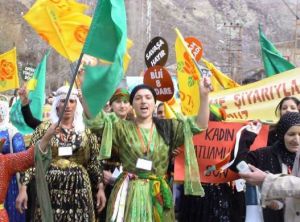PKK’s new “task” as “mercenary”: To support Turkey’s ruling power in the Middle East?!

***
La balle est surtout dans le camp de la Turquie.
Même si le discours dominant des médias proches du pouvoir et du Premier ministre Erdogan laissent entendre le contraire.
La nouveauté, la vraie, serait que la Turquie accepte la trêve, et respecte le cessez-le-feu. Et puis, qu’elle libère les milliers de militants kurdes emprisonnés pour liens avec l’organisation «terroriste» du PKK. Le gouvernement du Parti de la Justice et du développement (AKP) a déposé au Parlement un «paquet» législatif à cet effet.
Ces libérations peuvent constituer un puissant levier dans les négociations, une monnaie d’échange et une manière aussi de montrer sa «bonne foi» tandis que le 13 mars, le PKK a relâché huit prisonniers turcs (deux soldats et six fonctionnaires) qu’il détenait en Irak du nord.
On ne sait pas grand-chose de ce que le gouvernement AKP est prêt à céder. Il a écarté toute idée d’amnistie générale, mais les Kurdes insistent pour la remise en liberté ou, à défaut, l’assignation à résidence d’Abdullah Ocalan. Et puis, Ankara a rejeté la perspective de donner une autonomie régionale aux Kurdes. Or le chef du PKK pourrait avoir cédé sur ce point et adopté l’idée «d’une unité fraternelle des deux peuples au sein de la République turque».
Faut-il dès lors croire à ce processus? Après l’instauration d’une autonomie kurde en Irak, puis la constitution d’une nouvelle enclave kurde en Syrie par le PYD (la branche syrienne du PKK), la nouvelle configuration régionale devait logiquement conduire à un «printemps kurde» en Turquie.
C’est d’ailleurs ce qu’a tenté de faire militairement le PKK en 2012 en prenant pour un temps le contrôle de certains territoires du sud-est de la Turquie. Car les nationalistes kurdes ont été échaudés par la tentative de paix ratée de 2009, puis par l’offensive militaire et autoritaire qui a suivi la victoire électorale de l’AKP en 2011. Le manque de confiance est profond, le fossé large que certains observateurs disent impossible à combler.
***
Turkey and the Kurds on the Way to a Settlement?
Last week, Turkey reached a turning point in its bid to resolve its problem with Kurdish separatists when Abdullah Öcalan, the jailed leader of the Kurdistan Workers’ Party (PKK), released a public statement setting out conditions for a deal with the Turkish government. After months of negotiations with Ankara, Öcalan called for an end to the rebels’ armed struggle, advising Kurds to seek their rights in the political arena and asking PKK fighters to eventually leave Turkey.
Sinan Ülgen examines what this development means for regional and internal dynamics, including Turkish Prime Minister Recep Tayyip Erdoğan’s bid for increased power. He says any future agreement will depend on the ability of the new Turkish constitution, which is currently being drafted, to address Kurdish demands and accommodate Erdoğan’s ambitions.
By Sinan Ülgen
***
Agreement reached between Turkish government and Kurdish nationalist PKK
29 March 2013 – This is for two reasons.
First, the Erdogan government is looking for new props to attack the working class in Turkey. It is said that Erdogan wants to introduce a presidential system in Turkey as part of a new constitution, and wants to become president himself. The BDP could help him, if the AKP in return makes concessions to the Kurds.
A presidential system would strengthen the state vis-à-vis parliament and lend it more authoritarian traits. This is particularly important given Erdogan has largely neutralised the Turkish army as an independent power factor and brought it to heel. Erdogan does not hesitate to impose his neo-liberal policies with authoritarian means. He will be able to count on the BDP and its “left” appendages.
Secondly, the situation is worsening in Turkey’s neighbourhood. For some time, the Turkish government has been playing the role of US guard dog in relation to Syria. No other government is publicly so aggressive in arguing for “regime change” in Syria as is Erdogan’s. The Syrian “rebels” operate from Turkish territory, and have a central base of operations in Syria’s neighbour, Turkey.
While direct military aggression against Syria is fast approaching and is being prepared systematically, the Syrian Kurds pose a serious problem from Ankara’s point of view. The “rebels”, dominated by the Muslim Brotherhood and Al Qaeda-affiliated forces, have little influence in the Syrian Kurdish areas. The strongest force there is the PYD [Democratic Union Party], which is allied with the PKK and has long been supported by the Syrian regime.
Ocalan’s flowery phrases must be understood in this context, when he calls on the Turkish and Kurdish people “to throw off the yoke of tyranny” under the flag of Islam. Turks and Kurds, as “the two basic strategic powers of the Middle East”, are called upon to “build a democratic modernity.”
“The Middle East and Central Asia are in search of a contemporary modern and democratic concept that corresponds to their own history”, proclaimed Ocalan. It was “inevitable that Anatolia and Mesopotamia, the local culture and time, will be a pioneer in its construction again. It is as if we are experiencing an updated, more complicated and intense version of the Liberation War, which developed in recent history under the National Pact [1920] under the leadership of the Turks and Kurds.”
Put less pompously, this means that Turkey should be the ruling power in the Middle East, and the PKK is ready to support this as its mercenary.
By Jerry White
Filed under: Barış Süreci/Peace Process, Kürt Sorunu |








Laisser un commentaire